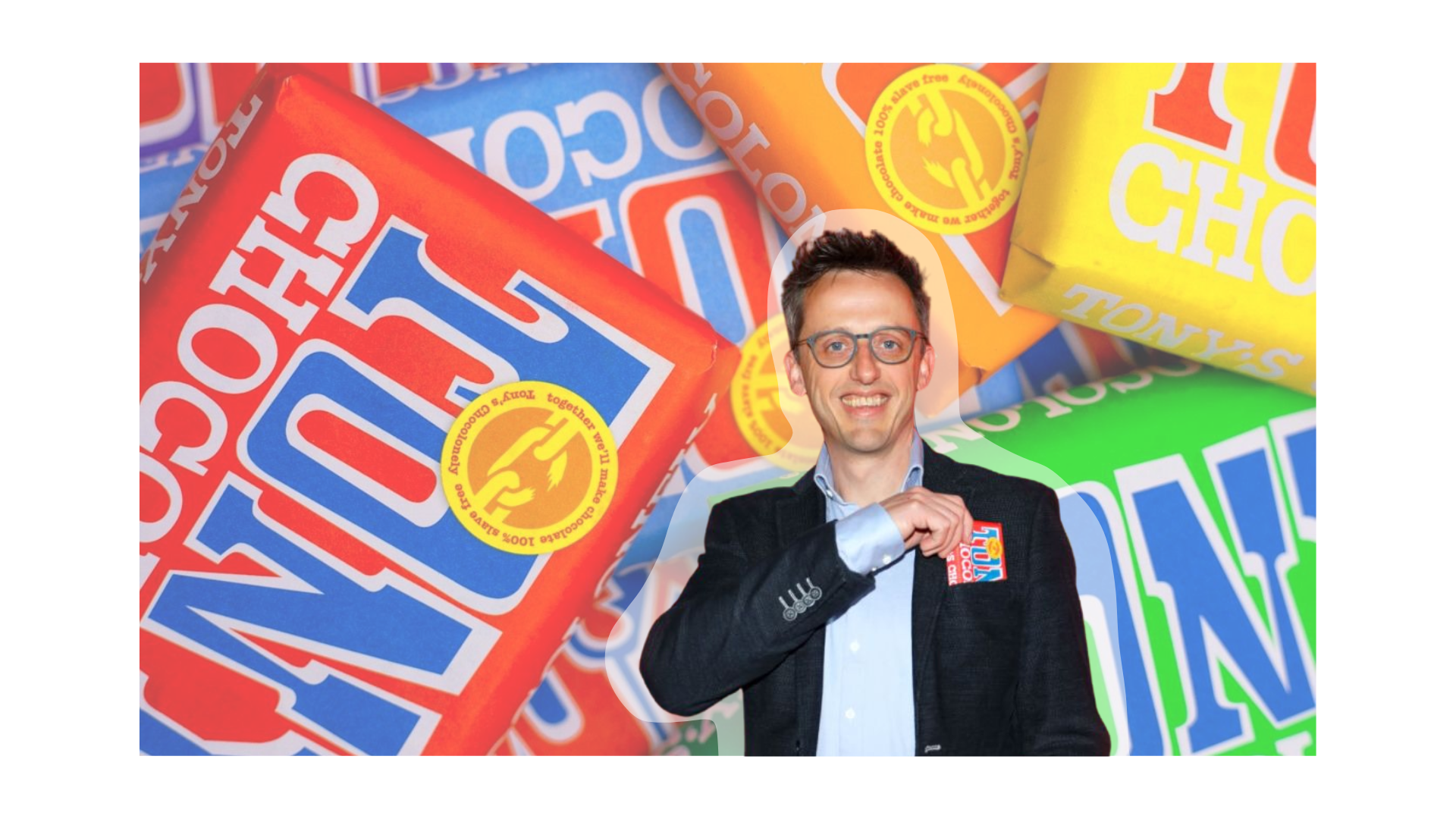Interview with Tony’s Chocolonely

This article focuses on Tony’s Chocolonely‘s scaling journey and highlights several key lessons learned from their internationalisation process.
Summary
Have you heard of the famous chocolate brand Tony’s Chocolonely?
Founded in 2005 in the Netherlands, Tony’s Chocolonely is a social enterprise that sells chocolate products and that aims to end exploitation in the cocoa industry. The company was born from an alarming observation. In Ghana and Ivory Coast, at least 30,000 people are victims of modern slavery in cocoa production. In addition, 2.3 million children still work on plantations.
Knowing that, the company set itself a mission to change the industry. Its work focuses on three main issues:
- Fighting against deforestation.
- Fighting against the extreme poverty of cocoa farmers;
- Developing a programme to eradicate child labour in the supply chains;
Over the years, the Dutch company grew into a global organisation. Today it sells in more than 50 countries and has offices in New York, London, Hamburg and Salzburg. By 2022, Tony’s recorded €150 million in sales, making it one of the Netherlands’ largest chocolate manufacturers.
Focus on Paul Schoenmakers
Paul Schoenmakers was Tony’s Chocolonely’s Head of Impact from 2017 to 2023. His mission was to guide the brand’s international development strategy, based on a sustainable cocoa supply chain.
This included working with farmers and cooperatives in Ghana and Côte d’Ivoire. He also developed extra activities in these countries and set up a partnership programme to engage other manufacturers in Tony’s mission.
At the same time, Paul worked with governments, NGOs and labelling bodies to accelerate change in the chocolate industry.
Paul Schoenmakers shared with us the expansion journey of Tony’s Chocolonely, that you can find below.
| ‘Tony’s Chocolonely is an impact organisation that makes chocolate, not a chocolate brand that tries to make an impact.’ |
Tony’s Chocolonely, an inspiring journey at an international level
In 2017, the Amsterdam-based company was just entering the US market, where major chocolate brands were already firmly established. Tony’s Chocolonely sourced its cocoa from farming cooperatives located in Ivory Coast and Ghana, the world’s largest cocoa exporters (around ⅔ of global production comes from these two countries). The ambition behind the internationalisation strategy in the United States was to show that it was possible to make chocolate in a different, sustainable and ethical way, and so inspire these brands to follow suit. To drive this change, Tony’s Chocolonely realised that it needed to be in both small and large markets in order to irradiate the entire cocoa market.
| ‘It wasn’t only about establishing our company and our product; what was important was to show that the working methods in this industry could evolve and that it is scalable internationally’ |
Tony’s international scaling strategy
Tony’s international expansion went through several stages and was based on the market’s maturity. The organisation identifies three market categories:
- Gold markets, large chocolate markets, where the presence of major brands is strong,
- Silver markets, important markets close to the Netherlands important to build Tony’s brand and presence,
- Bronze markets which offer opportunities for rapid growth.
This three-tier strategy involved working with a number of distributors for the bronze and silver markets, whereas gold markets involved creating local teams in the countries, meaning more investment to build the team, the presence with active storytelling and more engagement with customers. This is a costly approach but it is the most effective one in terms of creating a strong presence.
The challenges of a multi-tier strategy
Tony’s partner distributors showed great enthusiasm and interest in working with a social enterprise. However, working with distributors has two limits:
- As distributors work with other brands, Tony’s messages and vision are diluted among others,
- Distributors being intermediaries, it is more difficult to get Tony’s message across to retailers and consumers. Having your own teams on the ground is easier in terms of getting the company’s message across.
How was expansion financed?
Financing the expansion was a challenge but Tony’s was able to do so thanks to its operations in the Netherlands and, later on, with the help of investors. As production volumes increased, the company needed external funding to support the rise in activity and succeeded in raising funds from private investors who too shared their desire to change the cocoa industry on a global scale.
Key lessons from Tony’s internationalisation journey
One of the key lessons of Tony’s expansion phase was the importance of maintaining a consistent pitch while adapting to local preferences and practices. For example, in the United States, Tony’s had to adjust its tone and storytelling to better suit American culture, as the country is more sensitive to positive narratives highlighting the solution and its prospects rather than messages focusing on the problem to be solved. In each country where the company established a presence, there was a need to tweak the storytelling and make it resonate locally.
To develop its internationlisation strategy, the company followed a simple roadmap based on three pillars:
🔹 Raising awareness: reaching out to new markets and establishing the company’s reputation.
🔹 Leading by example: showcasing the way the organisation works and demonstrating its impact in terms of improving the living conditions and incomes of cocoa farmers, product traceability, action to fight deforestation, etc.
🔹 Inspire to act: even if Tony’s is developing very rapidly (growth of 25 to 50% from one year to the next), Tony’s is aware that it could never be the only chocolate brand in the world. That’s why the organisation has launched ‘Tony’s Open Chain’, a program that invites other companies to work together to source cocoa ethically and sustainably, contributing to a wider impact in the industry. The Netherlands’ largest retailer was the first organisation to join Tony’s, pooling its supply sources with those of Tony’s. By 2024, a further 15 companies had joined (including Ben & Jerry’s ice cream parlor and Aldi), increasing Tony’s impact. For these companies, joining Tony’s is an opportunity to build on a tested and proven program instead of reinventing the wheel, at a time when the existing cocoa certifications are insufficient to solve all the sector’s problems.
The importance of Human Resources when internationalising
Building local teams has been a key success factor for the social enterprise asTony’s was looking for people with specific skills, but also people who demonstrated a strong commitment to the organisation’s social mission – while being aware that it could not offer the same salaries as the large industrial companies in the sector. And even though Tony’s social purpose was the reason why the staff joined the company, maintaining Tony’s vision in the long run has been an ongoing challenge throughout the expansion process.. Expending implied a constant commitment to keeping the teams aligned with the company’s social mission while keeping them informed of the results.
The key to success according to Paul:
| “It lies in the essence of our mission: our story and our brand are strong. We have also been able to count on the support of the company in the Netherlands to develop an impact model that works: a model based on traceable cocoa, sourced directly from producers in Ivory Coast and Ghana, to whom we pay the legal minimum income, while eradicating child labour and establishing quality measures in our supply chain. All of this helps reinforce the credibility of the story we are telling.” |
Tony’s future ambitions
Tony’s is only at the beginning of its international expansion, and its ambition is to source 5% of Ivorian and Ghanaian production through Tony’s Open Chain over the next 5 to 10 years (it currently stands at 1-2%). Once Tony’s Open Chain accounts for 5% of total production in West Africa, the initiative will be a significant player, around half the size of Mars and Nestlé. This economic weight, combined with the effectiveness of Tony’s Open Chain program, will put increased pressure on the major brands to follow suit.
What is Tony’s contribution to system change?
The fact that ‘Tony’s Open Chain’ now includes 15 companies paves the way and shows that it is possible to work responsibly in this sector. That said, some organisations will continue ignoring the sector’s issues, which is why regulations are necessary. Tony’s can show what can be done, but it can’t do it alone, which is why the organisation is actively working with governments in the UK and the Netherlands, and then in Brussels, to lobby for better legislation. There are some very encouraging moves afoot towards stricter regulation so that companies take more responsibility for their supply chains.
Paul’s final advice
According to Paul Schoenmakers, it’s important to have a clear mission and to be good at every level when internationalising:
| “If you’re very mission-driven but your product isn’t good, people won’t buy it, even out of sympathy for your efforts. So you need an attractive brand, the right programmes, a good product and results. Without these, it will be difficult to evolve successfully!” |
Find out more
📙 Read Tony’s impact report here : https://online.flippingbook.com/view/287207390/
🎥 Watch the interview here & here
👉 To find out more about our services, contact-us

